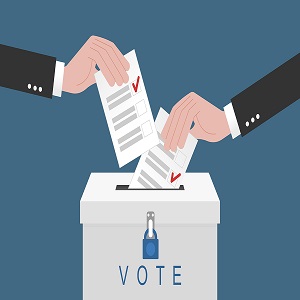Point: Universal Voting Makes Sense for a Full and Healthy Democracy

For another point of view see: Counterpoint: Mandatory Voting Is a Bad, Unconstitutional Idea
In our book “100% Democracy: The Case for Universal Voting,” E.J. Dionne and I make a case for universal voting — that voting should be a required civic duty for every American citizen.
Universal voting could be enacted federally or — more likely — by states or municipalities. If adopted, it would dramatically increase voting participation; make the voting electorate a complete reflection of our population; make government more responsive to everyone; improve the nature of our political campaigns; and lessen our toxic polarization, at least to a degree.
Universal voting has not been seriously discussed in this country, but it is hardly a new or radical idea. First, the system is used in 26 democratic countries worldwide, including Argentina, Belgium, Brazil, Greece, Luxembourg, Peru and Uruguay. The processes and practices vary; Australia is probably the best example for us. Mandatory participation has been in place since 1924, nearly 100 years. It is a widely accepted part of the country’s democratic process, and there have been no serious attempts to repeal it.
So how does it work?
The Australian Electoral Commission — a non-partisan, well-funded and professional agency — makes every effort to register voters, and conducts energetic public education about coming elections, as do the political parties and civil society organizations. Citizens are well aware of the elections as they get closer and of their responsibility to vote.
As of last December, 96.3 percent of Australians were registered, and in the election of 2019 (the figures are not yet published for the most recent election in May), 91.9 percent of those registered voted. It is important to note that Australians are not required to vote for any candidate; blank ballots and ballots with comments or cartoons, called “donkey ballots,” are acceptable.
In our recommendations for the United States, we recommend that a “none of the above” option be placed on all ballots.
After the election, the rolls are examined, and people who do not vote receive a notice asking for the reason. Almost all reasons are accepted, but if there is no response from the non-voter after two attempts, a fine of $20 in Aussie currency ($15 in the U.S.), is assessed. Less than 1 percent of potential voters were fined; the requirement is a recognized part of the civic culture.
And speaking of culture, elections are held on Saturday and have a celebratory nature, complete with ubiquitous “democracy sausage” stands at almost all polling places.
For another reason, closer to home, that voting as a civic duty is not a radical idea, think of jury service. Everyone is required to serve on juries as a matter of civic responsibility. This has been the case for more than 100 years, and we accept it as entirely reasonable, even if we may wince when the summons arrives.
The reason for doing this is clear; we want the “pool” of jurors to be fully reflective of our society as the surest means of a fair outcome. We think the same reasoning applies to voting: we want, or should want, the public policies that affect our lives, and the choices of who will be in office to make them, to be made by all of us, fully represented. And universal voting will bring that to us.
There are other benefits as well. We think the nature of campaigns would change for the better. Right now, the “currency of the realm” in campaigns is to turn out your base and, in worse-case scenarios, depress the turnout of your opposition. Some call this “enrage to engage.” But if everyone is going to vote, then everyone is listening all the time, and parties and campaigns will have to speak to everyone and will have to persuade a true majority that their ideas are the best. Persuasion, and not hyper-turnout efforts, will be the norm. In turn, that will help to lessen our toxic and increasing polarization.
Evidence also shows that in countries with universal voting, policies that help lessen inequality get stronger governmental support, and in our view, that would be a significant benefit.
We have been gratified that the initial response to our book and the idea has had far more expressions of interest in universal voting as a potentially game-changing idea and far less of the skepticism that naturally greets any big new proposal.
Universal voting is an idea that can move American democracy a long way to our stated ideals of a fully inclusive democracy. We are putting the idea of “100% Democracy” forward as a North Star goal, and we are eager for the conversation to begin.


